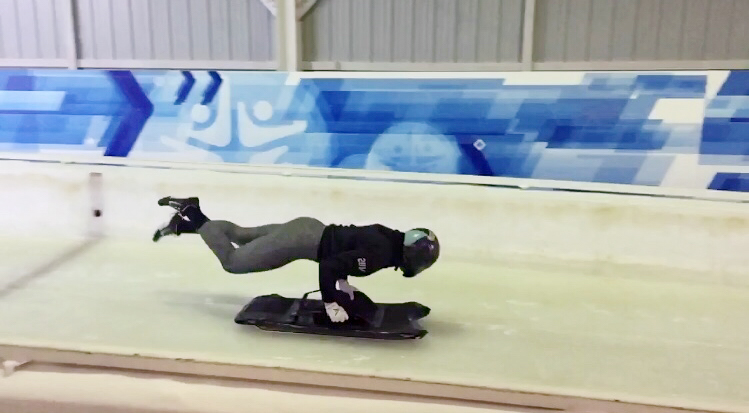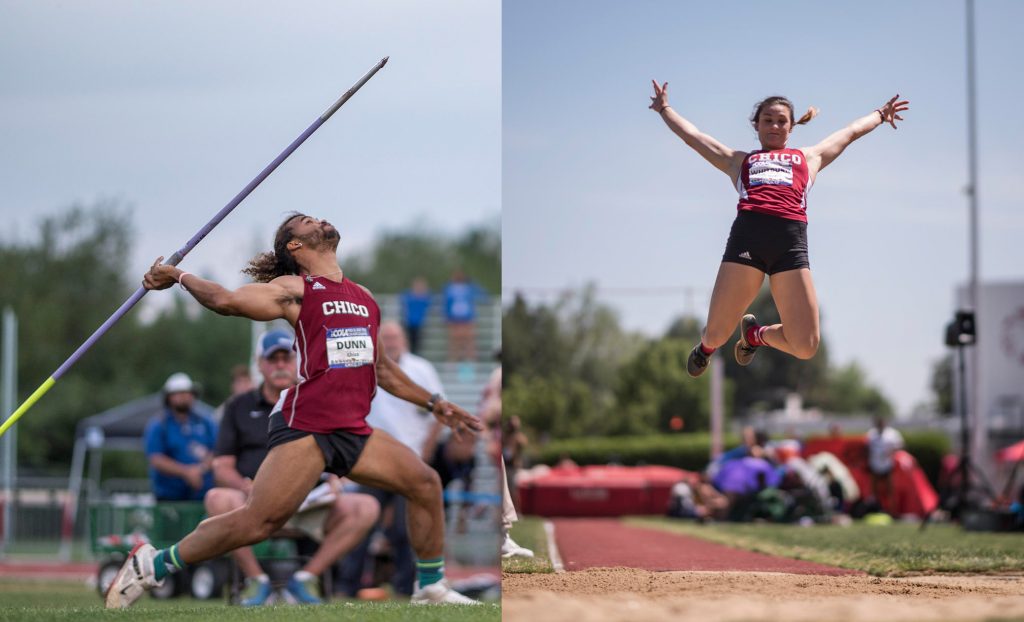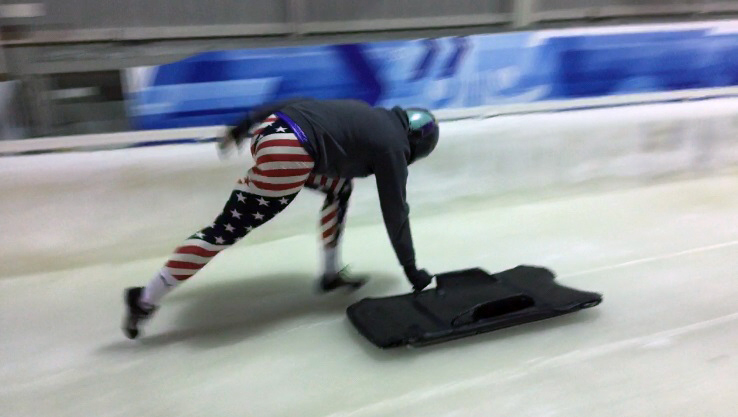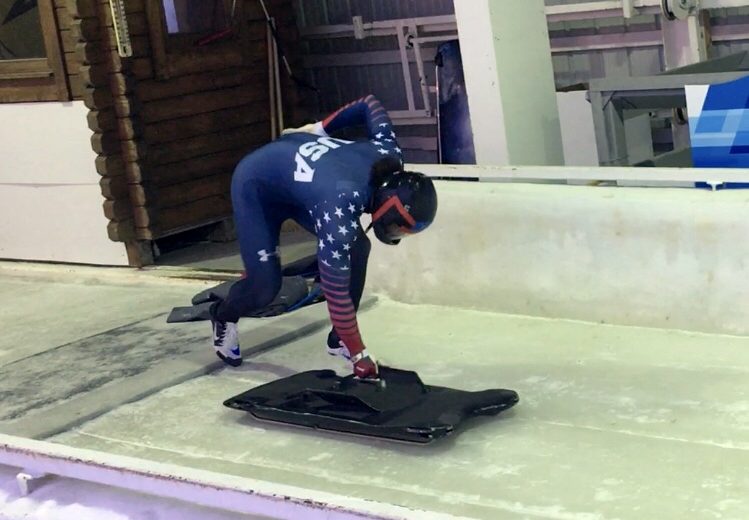From Sprints to Sleds: Wildcat Track Alums Make Their Push

The excitement of the Winter Olympics in Pyeongchang is not without a Chico State angle, as a pair of alums have broken in with the USA Bobsled and Skeleton Federation, the organization that cultivates Olympic talent for the United States. Brooke Whitburn (’17, exercise physiology) and Jason Dunn (’17, communications), both decorated track and field standouts at Chico State, received surprise requests following their Wildcat athletic careers—namely, to train with the federation in Lake Placid, New York after they impressed at the Chula Vista Combine, an athletic talent evaluation, last June. The two discussed the transition from sunny California to the icy tracks of the East Coast, and where their newfound sports may take them.
How did you first get involved with bobsled and skeleton?
Jason Dunn: After nationals in track, I was in a weird state. I was trying to figure out what I was going to do. I was having a hard time adjusting to not competing anymore. You go from being an athlete your whole life, where you don’t really have time to put significant effort toward anything else, to sort of not having that clear direction.
A couple of weeks after track season ended, [Chico State track and field coach] Oliver Hanf sent me a message and said, “I have a plan for you.” I got to his office, and he asked, “How do you feel about bobsled?”
I said, “I don’t know hardly anything about it—I’ve seen Cool Runnings, and that’s everything I know.”
Brooke Whitburn: I was pretty surprised, but Oliver has talked about it before in the past as a joke. But I was up for it. It was surprising, but I had nothing to lose.

Was there any hesitation or nervousness about trying a new sport?
JD: I was on the edge. I kept re-reading Coach’s email about going to the combine, and I just wasn’t sure. But Brooke really helped me get more motivated to do it.
BW: It was more of me saying we had nothing else to do! We had somewhere to stay— the combine was in Chula Vista, and my sister lives in Carslbad—and going together sounded like a really great experience for us. Knowing what kind of athlete he is, I thought it’d be something he’d be great at.
You knew you’d get the obligatory Cool Runnings questions, right?
JD: Oh my god, so many. If I had a dime for each time someone quoted that movie to me, I’d be traveling the world right now.
BW: I’d never seen it before! We watched it together the night before we left. I liked it!
What were your expectations for the rookie camp in Lake Placid, and how have those compared to your experiences there?
JD: To get that call was exciting. I’d never been to New York; all I ever heard is that it’s cold out there, it’s a big city, and the people are super rude. But when we started training at the push camp, it was upstate, and that surprised me. It felt really similar to Mt. Shasta, or even Oregon. Green everywhere, the Adirondacks surrounding us.
BW: I came out to the first camp unaware that for women’s bobsled it’s only two people! That was a surprise.
JD: There were 17 people total between the men’s and women’s teams, so being part of that group felt special. We had been training for bobsled, and then coach asked if anyone wanted to try skeleton. I started to do it, and every day instead of going back to the dorm facility after bobsled, I’d do a double day. I’d eat a meal, then come back and do skeleton. Coaches were hesitant, because they really wanted me to focus on bobsled and thought I might overtrain if I was doing both. I just said, “I’m a decathlete.” It felt natural to do multiple events at a time.
BW: When they started breaking down the costs, that was surprising. You’re not sponsored, and nothing’s paid for until you make a World Cup or Olympic team. Then, when I transitioned into skeleton, they tell you you have to learn the courses, so your preparation time is about 4–6 years. That was a “wow” moment to me. It blows my mind that people start this sport and can dedicate 20 years of their lives to it.

Were you surprised to see how well you did in competition?
JD: I wanted to be top 10 in bobsled, and in my first two runs I was fifth and sixth overall, so that was good. It was within my goal. But with skeleton, I didn’t really have a goal. The first run goes, and I had the best one. I was stunned. I just said, “Whoa, I’m in first. That’s … interesting!”
I was in a close competition with a friend I have out there. They collect all the times over your three runs, and after his third, he got a fast time to get ahead of me. I knew I’d have to do something crazy to get first place.
So I pushed, and when I started I felt good right away. I got on the sled, that felt good, too. As I came down, I saw everybody was running toward me, and people were screaming, “You PR’d, you won!” It was crazy. I went there for bobsled and ended up taking first in the skeleton.
How do you see bobsled and skeleton fitting in to your future now?
BW: It’s exciting, but kind of overwhelming, to be honest. Coaches tell everyone that even after four years, chances aren’t high of being an Olympian or in a World Cup. It takes more like six years. If this is something I’m going to go all in on, and do and commit myself to, that’s something I need to consider.
JD: Decathletes and multis are becoming the next biggest thing in the sport. They want a mixture of strength, power and speed, but also someone who’s heavier, because on ice that means faster times. They are recruiting athletes who have the essentials already embedded, athletes like me. I weigh 25 pounds more than most athletes in my sport but I’m running faster, and you’re seeing that in the whole skeleton community: short, stocky guys with great push times.

What’s next?
JD: We’re part of the development team for the future, so we’ll have opportunities to get better and compete. I’m a brakeman in bobsled, and that’s kind of like a utility player— the skill is mostly on the driver, and I’d be there if I had a great push and could join a team. But skeleton to me feels more natural and easy. You never know. I’d love to do both.
BW: For me, it’s still about getting a feel for the sport. I’m improving daily, so it does give me hope. The stage we’re at now is still very beginner, really learning-focused. But when I get a sled that fits me, has better runners and isn’t 25 years old, results could be very different! It’s a lot to consider, because I was planning on grad school before this came up. But to have the potential to even compete for the United States is exciting to think about.


